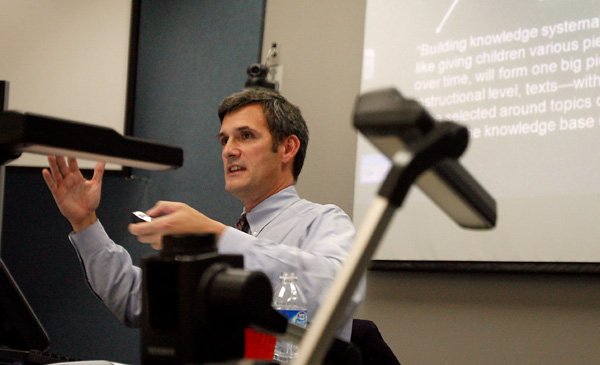Education reformers overlook a main component of teaching children to read that would improve standardized test scores and lower Arkansas’s remediation rate among graduating high school seniors, said Rob Pondiscio, Core Knowledge communications director.
“Reading is not a skill,” Pondiscio said. “We’re not telling you what to teachyour kids. We’re telling you what they need to know to be good readers. You have to have a certain amount of background knowledge or you can’t do it.”
Pondiscio spoke Friday to University of Arkansas at Fayetteville faculty, students, staff and officials from local school boards.
He argued that reformers should focus more on content in schools’ curriculum and create a broad back-ground for students. Currently, schools do not standardize what is taught in each school, he said.
Core Knowledge Foundation is a nonprofit that creates curriculum used by schools and others nationwide. About 69 individuals, day cares and schools use Core Knowledge in Arkansas, according to the organization’s website. Books are often available in bookstores and used by homeschoolers, he said.
Pondiscio’s ideas spark debate that could lead to improvements in local schools, said Jay Greene, UA education reform department chairman.
Arkansas students’ reading and math scores have not improved during the past four decades, Greene said. About 34 percent of students entering fourth grade scored below reading proficiency last year, according to an Arkansas School Performance report.
“Ninety percent of kids who don’t read on grade level by third grade, never read at grade level,” Pondiscio said.
Currently, about 45 percent of seniors graduating from public high schools need remedial work before entering college, according to report from the Arkansas Department of Higher Education report released this year.
“Everyone will agree we can do better,” Greene said.
Pondiscio said to improve remediation rates, educators should start teaching with more focus on context andreading comprehension in elementary school. Pondiscio’s viewpoint is different than previous education reform movements that focused on skill training at the expense of knowledge-based courses like history or the arts, he said.
Schools nationwide are grappling with how to improve education as America slips in its international education rankings.
More than 25 states, including Arkansas, are looking to improve primary education by adopting Common Core State Standards Initiative that establish what should be taught at different grade levels. The focus is to improve the state’s remediation rate and better prepare students for college or the workplace, said Gayle Potter, state Department of Education curriculum and assessment director.
The idea behind Core Knowledge diverges from other skills-based movements that focus mostly on the ability to work new technology, like computers.
The state Education Department plans to transition to core common standards in the next few years - something the Fayetteville School District is preparing for now, said Linda Auman, the Fayetteville district’s chief academic officer. The district is evaluating what core classes should be taught, will focus on content, but also plans to require students to learn skills, including using the Internet, she said.
“This is a natural movement, and it’s more to get our students prepared to compete at a global level,” Auman said.
Northwest Arkansas, Pages 7 on 11/06/2010

